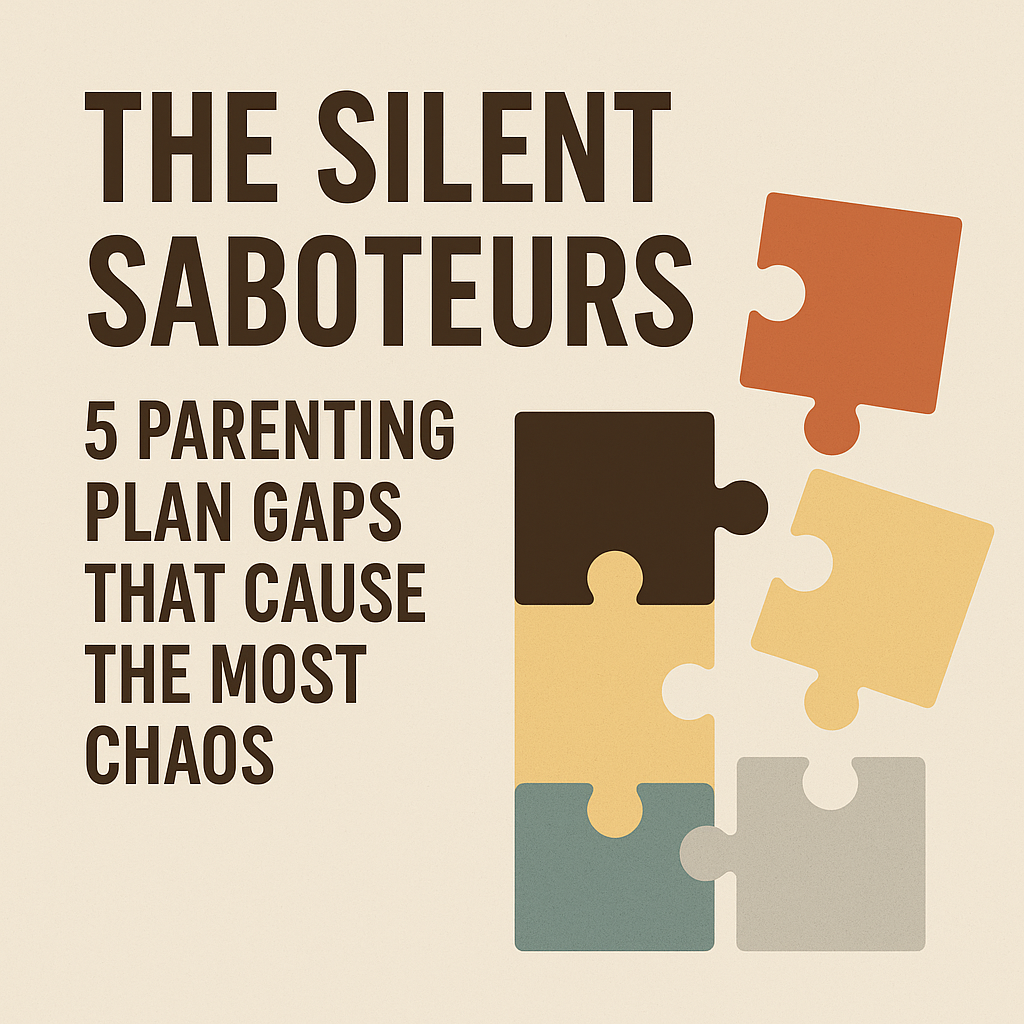
Most parenting plans, in my experience, do not collapse because parents disagree on how to raise their kids. What I have found—after years of navigating my own custody battles and coaching clients through theirs—is that the breakdown almost always stems from something far less obvious: vague wording, gray areas, or sometimes the complete absence of a plan.
Once conflict enters the mix, it feels like a forest fire—loud, all-consuming, and devastating. But here’s what gets overlooked: the fire never starts with the blaze. It begins with the embers. The tiny sparks of unclear language, undefined rules, or missing agreements are what ignite the chaos.
And while you may eventually put out the blaze, the embers remain. Left unaddressed, they will flare up again, often fiercer than before, until the whole forest feels like it’s burning. That’s why the silent saboteurs of a parenting plan are so dangerous—they don’t just cause conflict once, they guarantee conflict will return.
The 5 Silent Saboteurs
1. Ambiguous Holiday Schedules
In theory, “we’ll just work it out” feels friendly and flexible. In reality, it is a ticking time bomb. I’ve seen Christmas Eve turn into a hostage negotiation and routine exchanges turn into shouting matches. When schedules are left vague, emotions run high and conflict fills the vacuum.
Holidays carry heavy emotional weight. If they are not clearly spelled out, they become weapons. A well-crafted plan removes the guessing game and ensures the kids get to enjoy the moment without being dragged into parental crossfire.
2. Unclear Travel & Relocation Rules
Few issues spark emergency court battles faster than travel and relocation. What counts as “travel”? Is crossing a state line for the day considered relocation? What if a parent wants to move two hours away for a job?
If these details are not nailed down in the plan, disputes are inevitable. I’ve watched last-minute vacations blow up into full legal wars. I’ve also seen parents blindsided by relocation attempts that weren’t clearly restricted. Travel and relocation rules must be crystal clear. Otherwise, conflict becomes a permanent passenger in the co-parenting journey.
3. Vague Communication Boundaries
On the surface, letting kids call or FaceTime whenever they want sounds generous. But without boundaries, communication can quickly spiral into harassment or gatekeeping. I’ve seen phones become weapons—one parent calling non-stop, or the other parent blocking contact altogether.
Healthy communication rules don’t restrict relationships; they protect them. Strong plans set clear expectations for when, how often, and how long kids and parents can connect. This avoids misunderstandings and reduces accusations of interference, giving children consistency they can trust.
4. Financial Gray Areas Beyond Child Support
Child support alone does not cover the true cost of raising children. Extracurricular activities, school trips, sports fees, and braces all fall outside the official number. When these expenses aren’t addressed, resentment builds fast.
I’ve seen one parent silently carry the financial burden while the other claims “it’s not in the order.” I’ve also seen children miss out on opportunities because parents couldn’t agree who should pay. A solid plan outlines how these costs are divided, removing the gray zone where fights breed. This is one of the most overlooked sections—and one of the most important.
5. No Dispute Resolution Path
The honeymoon phase of a parenting plan always feels optimistic. Parents agree, things seem fine, and conflict feels far away. But disagreements are inevitable. And if your plan does not spell out how disputes will be resolved, every single conflict heads straight to court.
I’ve watched parents spend thousands of dollars on issues that could have been resolved with a simple mediation clause or tie-breaking mechanism. When there is no resolution process, the courtroom becomes the default. That is not sustainable. A well-built plan gives parents a roadmap for handling conflict without burning down their finances and their peace.
Why These Gaps Persist
A plan full of loopholes or gray areas leaves room for a high-conflict parent to exert control and impose their will. I’ve seen both men and women do this. But here’s the striking thing: when the plan becomes ironclad—when loopholes are closed and foresight is built in to anticipate future cracks—the conflict has nowhere left to grow. It often feels like it “magically” disappears.
So why aren’t all plans built this way?
The truth is, the system unintentionally contributes to the problem. Attorneys make money by drafting quickly. Judges are buried under mountains of cases. The result? Parenting plans that default to vague, “standard” language because it’s the easiest button to press. Not malicious, but not enough either.
We need more.
Toward a Standard of Quality
What we’re missing in family law is quality control. Parenting plans should not be drafted like patchwork quilts, each one stitched with holes that invite conflict. We need a repeatable standard—a framework parents, attorneys, and even judges can lean on—that prioritizes clarity, foresight, and enforceability.
I believe we can get there. In fact, I’ve seen it work.
Through my own high-conflict battles, deep research into custody planning, and years of coaching clients, I have developed a framework that closes loopholes, removes gray areas, and builds in safeguards against future disputes. It’s not about reinventing the wheel for every family. It’s about setting a consistent, child-focused standard that works in real life.
From Story to Solution
That’s why I created the Parenting Plan Reset and the Ironclad Parenting Plan Strategy Development Kit.
They are rooted in my lived story, forged through personal custody battles where I refused to let loopholes control my parenting.
They are grounded in professional coaching insight, sharpened by the patterns I’ve seen across countless coaching clients.
They are designed as repeatable frameworks, so parents don’t have to reinvent the wheel every time a plan is written.
These are not just tools for parents—they a standard that can guide families in times of crisis.
Final Word & Call to Action
A parenting plan isn’t just a legal document—it’s the framework that governs your child’s world. If it has leaks, you’ll spend your co-parenting years bailing water instead of steering forward.
Think of it like armor. Most plans are written like chain mail—protective at first glance, but riddled with holes. My work is closer to plate armor: solid, airtight, with no easy entry points for conflict.
When the loopholes close, peace has room to grow.
👉 Start with the Parenting Plan Reset, or go all-in with the Ironclad Parenting Plan Framework. Because peace at home starts with a plan that leaves no room for chaos.
Legal Disclaimer
Elevatus Coaching LLC provides educational resources, coaching frameworks, and strategic guidance to help individuals navigate co-parenting, post-divorce transitions, and personal development. All materials, including the Ironclad Parenting Plan Framework System, are designed for educational and informational purposes only. Nothing provided by Elevatus Coaching — whether written, spoken, or delivered through products, sessions, or digital content — constitutes legal advice, legal representation, or the practice of law.
🔄Did you find this article helpful? Share it!

About the Author - Danny DeJesus
Danny De Jesus is a transformational resilience thought leader, strategic thinker, and the founder of Elevatus Coaching—a practice built to help people rebuild their lives after major change. Drawing from his own experiences with divorce, co-parenting, and career shifts, he created the C2R2E Framework to guide people from collapse to elevation with clarity and confidence. Through the Elevatus Blog, he shares insights for anyone navigating disruption, rebuilding direction, or shaping a new chapter with purpose.
